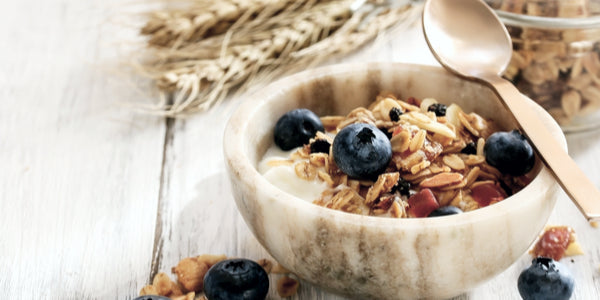
The colon, or the large intestine, is part of the digestive tract and plays an active and fascinating role in everyday life.
Because did you know the colon...
...is also known as the second brain due to its ability to influence behavior?
...contains nearly 100 million neurons and houses trillions of microbes that help digest nutrients from food as well as break down toxins that enter the body?
...is closely linked to immune health as well, and the colon is where about 70 percent of immune cells reside?
With such unique roles in the body, the colon functions best when nourished appropriately. Read on to discover the best foods good for the colon and digestion!
8 Foods for Colon Health
Food can either worsen common digestive problems by acting as a toxin or promote gut health by balancing the colon and its environment.
Improving eating choices helps contribute to a healthy balance of good bacteria and strong structures that protect the intestines.
From whole grains to lean proteins, keep the colon healthy with these nutritious foods.
1. Whole Grains & Legumes
The body needs around 25 grams of fiber each day to maximize colon health, and recent reports suggest that most people eat less than half of the recommended daily amounts.
Unlike refined carbohydrates, whole grains and whole wheats are rich in fiber in other nutrients that aid in digestion and promote regular bowel movements.
Additionally, good bacteria in the gut, the kind that helps keep the colon balanced and healthy, thrive on fiber.
Sources of Whole Grains:
• Barley
• Brown rice
• Quinoa
• Oats
• Whole wheat
2. Leafy Greens & Vegetables
A variety of plant-based foods helps to feed the diverse microbial community of the gut. Vegetables are also good sources of fiber, which not only prompt good gut health but help to encourage a healthy balance of good bacteria in the gut.
Like whole grains, leafy greens are fibrous, nutrient-rich powerhouse vegetables that pack a punch in terms of vitamins and minerals.
Leafy Greens & Veggies Examples:
• Asparagus
• Beans
• Leeks
• Spinach
• Kale
• Peas
• Scallions
• Shallots
Overall, try to include a variety of veggies with meals and snacks. The more colorful the plate, the better!
3. Lean Protein
There is much chatter regarding the link between red meat, processed meats, and colon cancer. What's more, the World Cancer Research Fund reports there is evidence that red or processed meat are both causes of colorectal cancer.
However, new research on red and processed meat guidelines suggests recommendations are primarily based on observational studies. Such studies cannot conclude cause and effect.
Overall, limit the intake of overly processed foods and meats such as hot dogs and breakfast sausages. Aim to include more lean and skinless proteins, such as those listed below, that tend to be lower in fat.
Lean Meats & Other Sources of Protein:
• Nuts and seeds
• Chicken
• Turkey
• Duck
• Poultry
• Fish
• Seafood
4. Low-Sugar Fruits
Fruits like apples, pears, and mangos have higher fructose (sugar) content. Even though these are "fruit sugars", overconsumption can still cause bloating, gas, or other symptoms.
Low-Sugar Fruit Sources:
• Avocados
• Berries
• Cranberries
• Lemons
• Limes
• Guavas
5. Prebiotic & Probiotic Foods
Yogurt, fermented foods, and other delicious pre- and pro- biotic filled foods can help support good digestive health.
Fermented foods have beneficial bacteria, according to The Blue Zones, an organization that researches the world's longest-lived cultures to help find what makes people live longer, better, and ultimately healthier lives.
Non-dairy yogurt and yogurt alternatives often have live active cultures (LAC) added to them, but it’s always best to check the label to be sure!
Yogurt (Low-Sugar, with LAC):
• Helps existing gut bacteria to flourish
• Encourages a diverse microbial community
Other Pre- & Probiotic Sources:
• Cheeses
• Kefir
• Kimchi
• Kombucha
• Miso
• Onions
• Sauerkraut
• Tempeh
6. Healthy Fats
People hear the word "fat" and usually run away. But do not just yet…
Healthy fats provide both necessary calories and nutrients and encourage a balanced gut environment. Many vegetables and protein-packed food options offer a healthy serving of fat as well.
Vegetable Oils (i.e. Olive Oil):
• Contain compounds that promote good gut bacteria growth
• An easy way to add extra nutrients to the diet
Nuts & Seeds Nutrition:
• L-glutamine, an amino acid that supports healthy gut lining
• Prebiotics
• Fiber
• Protein
• Fats
• Nutrients necessary for a healthy gut
7. Foods Rich in Polyphenols
Polyphenols are plant-based molecules that help fuel the healthy bacteria of the gut. Foods rich in these compounds tend to have higher levels of fiber, other helpful nutrients, and anti-inflammatory properties as well.
Polyphenol-Rich Foods:
• Fruits and vegetables
• Red grapes
• Almonds
• Onions
• Blueberries
• Broccoli
• Dark chocolate
8. Spices & Seasonings
Blends of certain spices and seasonings have been used for ages to heal the gut and restore balance after an unbalance caused by harmful bacteria.
The spices listed also promote good gut bacteria, so try mixing these blends into a recipe soon!
Spices for Gut Health:
• Garlic
• Turmeric (curcumin)
• Ginger
Overall, aim to include more wholesome, nourishing foods in the diet. Likewise, talk to a doctor or another health professional if experiencing issues with digestion.
References:
Johns Hopkins Medicine. Eating for your gut. The Johns Hopkins University, The Johns Hopkins Hospital, and Johns Hopkins Hospital Health System. 2020. https://www.hopkinsmedicine.org/health/wellness-and-prevention/eating-for-your-gut.
Johns Hopkins Medicine. 5 Foods to Improve Your Digestion. The Johns Hopkins University, The Johns Hopkins Hospital, and Johns Hopkins Hospital Health System. 2020. https://www.hopkinsmedicine.org/health/wellness-and-prevention/5-foods-to-improve-your-digestion.
Kunces L. 8 Food and Drinks That Promote Gut Health. Thorne. 2019. https://www.thorne.com/take-5-daily/article/8-foods-and-drinks-that-promote-gut-health.
Paris J. How to improve your gut health. Alina Health. 2020. https://www.allinahealth.org/healthysetgo/heal/how-to-improve-your-gut-health.
Titgemeier B. What Does it Mean to Have Poor Gut Health or Gut Dysbiosis? Being Brigid: Functional Nutrition. 2020. https://beingbrigid.com/gut-dysbiosis/.







